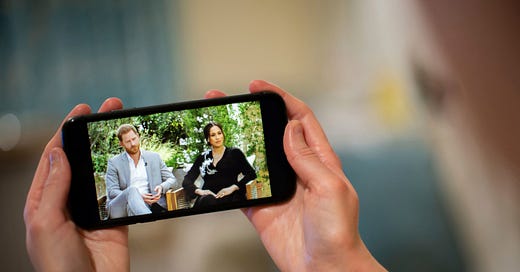Related highlights:
—
There’s the truth, and then there’s everything else.
There is no “my truth." There is no “your truth." There is what is, and there is what isn’t. A thing does not become “true” by virtue of the fact that you claim it as such in your mind. This is both delusional and remarkably egotistical.
Oprah Winfrey, who champions the personal “truth” feel-good psychobabble, asked Meghan, Duchess of Sussex, in an interview that aired this weekend, “How do you feel about the palace hearing you speak your truth today?"
Oh, please. Stop it.
Why not just speak the truth and allow the rest of us to sort out the information as we may?
Well, as journalist Garance Franke-Ruta explained of the “your truth” construct in 2018 after Oprah’s appearance at the Golden Globes awards, “sometimes you know something is real and happened and is wrong, even if the world says it’s just the way things are. It’s a call to activism rooted in the individual story, grounded in personal experience.”
First, isn’t this just the truth? It’s the world that is wrong, not you.
Second, as the litany of cranks promoted by Oprah demonstrates, personal “truth,” as opposed to the truth itself, sometimes looks an awful lot like an outright falsehood.
Suzanne Somers spoke her “truth” when she told Oprah’s viewers the secret to looking youthful involves estrogen injections directly to the vagina (please don’t do this). Former MTV host Jenny McCarthy likewise spoke her “truth” when she told Oprah’s viewers vaccines cause autism.
Appeals to personal “truth,” by the way, are not unique to Oprah's roster of guests.
“My truth," Lincoln Project co-founder Steve Schmidt declared last month when he shared a grotesque, self-serving statement claiming he was blindsided by reports alleging fellow Lincoln Project co-founder John Weaver offered as many as 21 young men, including a 14-year-old boy, career opportunities in return for sexual favors.
While we’re on the topic of politics, who is to say former President Donald Trump isn't simply speaking "his truth" when he says the 2020 election was stolen?
These are not “truths.” These are personal beliefs (well, insofar as the cynical Schmidt is concerned, his “truth” is more likely an attempt at emotional manipulation). But a personal belief, no matter how devoutly and earnestly held, is not the same thing as the truth.
Personal "truth" can be a powerful tool, the Atlantic’s Conor Friedersdorf correctly noted in 2018. And “powerful tools can be used for good and ill,” he adds, “they can have ill effects even when used with the best of intentions; and that tools of great power confer great responsibility on all users."
Insofar as Oprah’s 2018 Golden Globes speech “was delivered to hundreds of powerful Hollywood celebrities now proclaiming themselves inspired by Oprah’s words, clarity on that point is essential,” he adds. “Going forward, Oprah would do well to assert her full, rightful claims to ‘the truth’ when speaking it—as she often does insightfully—while eschewing untruths (even when they are ‘her truths,’ or expressions that people she esteems earnestly regard as ‘their truths’) in recognition of the power she wields.”
Even simpler, Oprah and others who want to speak the truth can do just that. Leave the "my" at the door.
Because do you know what doesn’t avail itself so easily to exploitation and abuse by cynical and ignorant individuals? The truth, plain and simple.




